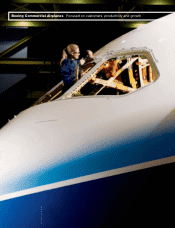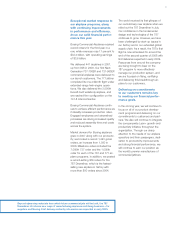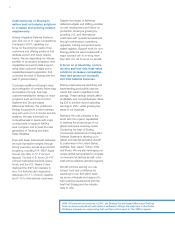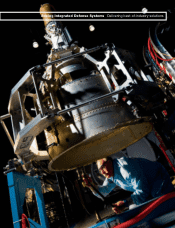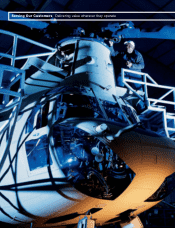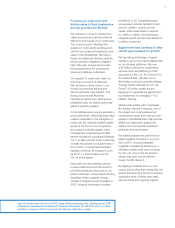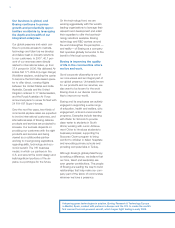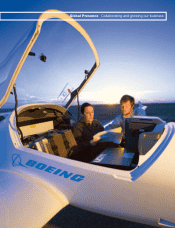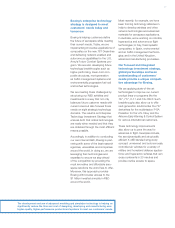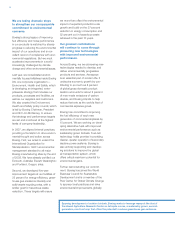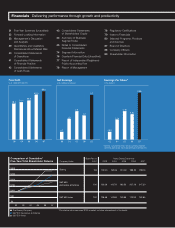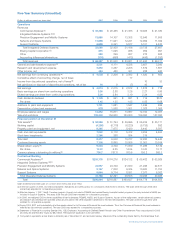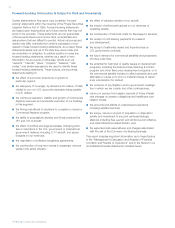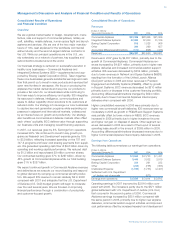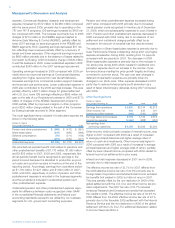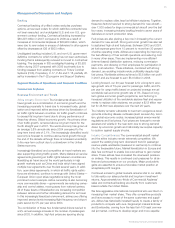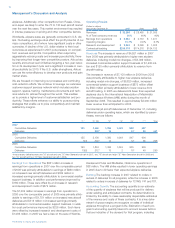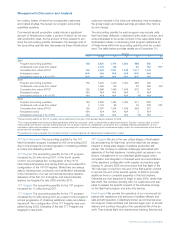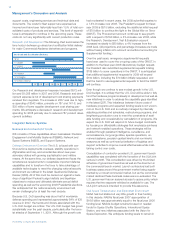Boeing 2007 Annual Report Download - page 21
Download and view the complete annual report
Please find page 21 of the 2007 Boeing annual report below. You can navigate through the pages in the report by either clicking on the pages listed below, or by using the keyword search tool below to find specific information within the annual report.
18
We are taking dramatic steps
to strengthen our companywide
commitment to environmental
concerns.
Boeing’s strong legacy of improving
fuel efficiency and noise performance
in our products is matched by steady
progress in reducing the environmental
impact of our operations and an ex-
cellent record of compliance with envi-
ronmental regulations. But we must
accelerate improvements in a world
increasingly challenged by climate
change and other environmental issues.
Last year, we consolidated environ-
mentally focused initiatives inside Boeing
into one corporate organization —
Environment, Health and Safety, which
is developing an integrated, enter-
prisewide strategy that includes our
products, processes and facilities, as
well as our suppliers and customers.
We also created the Environment,
Health and Safety policy council, which
is led by Boeing Chairman, President
and CEO Jim McNerney, to ensure
that strategy and performance targets
are set and monitored at the highest
levels of company leadership.
In 2007, we aligned internal practices,
providing a foundation to drive environ-
mental thought and action across
Boeing. First, we acted to extend the
International Organization for
Standardization 14001 environmental
management standard to all major
Boeing manufacturing sites by the end
of 2008. We have already certified our
Exmouth, Australia; Everett, Washington;
and Portland, Oregon, sites.
Second, we developed five-year
improvement targets at our facilities of
25 percent for energy efficiency, green-
house gas emissions intensity and
solid-waste recycling rates, with a
similar goal for hazardous-waste
reduction. These targets will ensure
we more than offset the environmental
impact of expected production-rate
growth and build on the 37-percent
reduction in energy consumption and
52-percent cut in hazardous waste
achieved in the past 10 years.
Our greatest contributions
will continue to come through
pioneering new technologies
with improved environmental
performance.
Across Boeing, we are pioneering new
technologies needed to develop and
deliver environmentally progressive
products and services. Aerospace
is an essential part of modern life. It
underpins economic growth by con-
tributing to as much as 8 percent
of global gross domestic product.
Aviation accounts for about 2 percent
of man-made emissions of carbon
dioxide, and Boeing intends to help
reduce that rate as the world’s fleet of
commercial airplanes grows.
Boeing has committed to improving
the fuel efficiency of each new
generation of commercial airplanes by
15 percent. We are working on devel-
oping alternative fuels with improved
environmental performance such as
sustainably grown biofuels. Fuel-cell
technology holds promise in providing
cleaner, quieter operation of secondary
airplane power systems. Boeing is
also actively supporting and develop-
ing solutions to improve the global
air transportation system, which
offers critical near-term potential for
environmental gains.
Further demonstrating our commit-
ment, Boeing has joined the World
Business Council for Sustainable
Development and is a member of the
Pew Center for Global Climate Change
to sponsor best practices and drive
environmental improvements globally.
Spurring development of aviation biofuels, Boeing seeks to leverage research like that of
the Hawaii Agriculture Research Center on Jatropha curcas, a sustainably grown, second-
generation, non-food crop that offers the potential to reduce greenhouse gas emissions.


